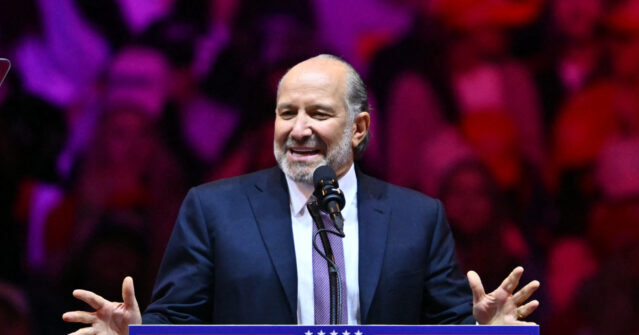President Donald Trump is set to announce the appointment of Howard Lutnick, the CEO of Cantor Fitzgerald and a notable figure on Wall Street, as the new Commerce Secretary. This choice reflects Trump’s ongoing strategy of populating key economic positions with business leaders. By selecting Lutnick, who has proven experience in the private sector, Trump continues to prioritize individuals with business expertise over those with traditional political backgrounds, aligning with his administration’s emphasis on a pro-business agenda. Lutnick’s appointment comes at a crucial time for United States economic policy, as the country grapples with impending trade negotiations and ongoing discussions surrounding tariffs, particularly in the context of U.S.-China relations.
Lutnick has consistently been a vocal supporter of Trump’s tariff strategies, even in the face of skepticism from some Wall Street analysts who express concern about potential trade wars and increased consumer prices. This advocacy places him in direct alignment with Trump’s intent to fortify American industries and reduce reliance on foreign imports. Lutnick’s extensive experience in the business world, coupled with his resilient leadership during challenging times—most notably after the tragic events of 9/11 that saw Cantor Fitzgerald lose 658 employees—positions him as a determined figure capable of addressing significant crises. His ability to manage adversity and navigate complex economic situations may prove invaluable as he takes on the role of Commerce Secretary amid today’s turbulent economic landscape.
In addition to his reputation for crisis management, Lutnick is a strong proponent of leveraging advancements in technology to modernize various industries. At Cantor Fitzgerald, he spearheaded the shift toward electronic trading platforms, which transformed the operations of global markets. His deep understanding of financial technology and innovation will likely influence his policies at the Commerce Department, especially regarding the regulation of emerging industries such as cryptocurrency and the expansion of 5G infrastructure. Lutnick’s technological acumen might also drive the Commerce Department to adopt modernized practices that promote efficiency and adapt to the rapidly changing economic environment.
Trade policy is anticipated to be a focal point of Lutnick’s tenure as Commerce Secretary. His preference for taking a robust stance against foreign competition aligns with the Trump administration’s broader objective of strengthening domestic manufacturing and addressing economic grievances related to trade practices, particularly those perceived as unfair in China. Lutnick’s extensive background on Wall Street could equip him with the necessary skills for negotiating impactful trade agreements. Drawing from the success of Wilbur Ross, his predecessor and fellow Wall Street veteran, Lutnick may aim to replicate and evolve the effective advocacy for tariff policies that characterized Ross’s time at the Commerce Department.
Under Lutnick’s leadership, the Commerce Department may likely experience a significant shift, with increased emphasis on technological innovation and public-private partnerships as means to stimulate economic growth. His track record suggests that these elements could become vital to the department’s strategic priorities as it works to promote American businesses, regulate international trade, and oversee critical industries. Lutnick’s approach is expected to marry traditional commerce objectives with modern strategies designed to leverage technology as a catalyst for growth, potentially reshaping the U.S. role in the global economic arena.
While it remains to be seen how Lutnick’s financial expertise will translate into effective governance in Washington, his anticipated appointment underscores a clear message from President Trump: America’s economic strategy will be led by seasoned business figures who understand the complexities of global competition. Lutnick was previously under consideration for the Secretary of the Treasury position, with other potential candidates, such as Kevin Warsh and Scott Bessent, still being evaluated. Nevertheless, his upcoming role as Commerce Secretary signifies a pivotal commitment by the Trump administration to enlisting leaders who can effectively navigate the challenges of a competitive economic landscape.

